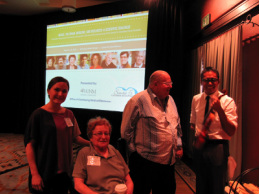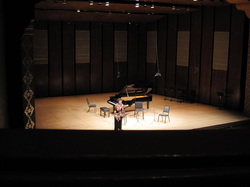 Two months ago, August 4-6, Santa Fe Chamber Music Festival celebrated its 40th anniversary season with an unusual ... and unforgettable conference, Music, the Brain, Medicine and Wellness. The conference was the brainchild of Marc Neikrug, Barrie Cassileth, and Cheryl Willman, which brought together over 100 musicians, music therapists, neuroscientists, physicians and health caregivers to share cutting-edge knowledge about how music heals, impacts brain development, affects language ... and enhances empathy.  Day 1: This day was led by several music neuroscience superstars including Aniruddh Patel (read about him in this NYTimes interview of Ani from a few years ago), Gottfried Schlaug (his website is musicianbrain.com), Laurel Trainor and many others, who shared new insights on Music and Language, Music and Cognition, Music and Behavior, Music and Child Development, to name just a few.  How could these neuroscientific findings apply to daily clinical practice? That was to be the work of Day 2. But before Day 1 ended, we were treated to a concert of Bach piano concertos performed with string quintet. The choice could not have been better - in Bach there is beauty and emotion found within the careful constructs of counterpoint and harmony. In these lectures, we were getting a glimpse of the elegance and beauty of the human brain as it responds to music. Day 2: We returned the next morning to an equally inspired day. New knowledge and insights are being revealed by the work of music neuroscientists. If a "Picture is worth 1000 words" then functional MRI and PET scanning is worth a million. Our new knowledge of music's impact on the brain is being applied to patients living with cancer, Parkinson's, autism, and Alzheimer's. Because music involves so many parts of the brains, including memory and emotion, even people with dementia can be deeply affected...and sometimes transformed...by hearing music.Two of the presenters included this video in their talks.
3 Comments
1/29/2013 09:44:15 pm
The creation, performance, significance, and even the definition of music vary according to culture and social context. Music ranges from strictly organized compositions, through improvisational music to aleatoric forms. Thanks.
Reply
5/5/2013 01:54:52 pm
Score is a term commonly used to refer to sheet music or the act of creating sheet music. Scoring music is the process of transcribing the music you have written or performed onto a staff manuscript so other musicians can read and play it. This is distinct from and should not be confused with scoring a film, which involves writing music for a film. Before audio technology existed, scoring music was the only way to record it for history. Now, it is typically used for educational and rehearsal purposes. Accuracy and clarity are extremely important. Thanks.
Reply
Leave a Reply. |
Dr. Lisa M. Wong
I'm a musician and pediatrician, passionate about arts in education and about bringing the community together through music Archives
October 2015
Categories
All
|
 RSS Feed
RSS Feed
